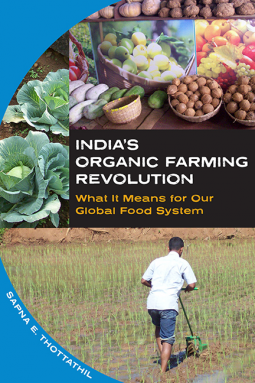
India's Organic Farming Revolution
What It Means for Our Global Food System
by Sapna E. Thottathil
This title was previously available on NetGalley and is now archived.
Send NetGalley books directly to your Kindle or Kindle app
1
To read on a Kindle or Kindle app, please add kindle@netgalley.com as an approved email address to receive files in your Amazon account. Click here for step-by-step instructions.
2
Also find your Kindle email address within your Amazon account, and enter it here.
Pub Date Oct 01 2014 | Archive Date Jun 11 2015
University of Iowa Press | University Of Iowa Press
Description
Sapna Thottathil calls on us to rethink the politics of organic food by focusing on what it means for the people who grow and sell it—what it means for their health, the health of their environment, and also their economic and political well-being. Taking readers to the state of Kerala in southern India, she shows us a place where the so-called “Green Revolution” program of hybrid seeds, synthetic fertilizers, and rising pesticide use had failed to reduce hunger while it caused a cascade of economic, medical, and environmental problems. Farmers burdened with huge debts from buying the new seeds and chemicals were committing suicide in troubling numbers. Farm laborers suffered from pesticide poisoning and rising rates of birth defects. A sharp fall in biodiversity worried environmental activists, and everyone was anxious about declining yields of key export crops like black pepper and coffee.
In their debates about how to solve these problems, farmers, environmentalists, and policymakers drew on Kerala’s history of and continuing commitment to grassroots democracy. In 2010, they took the unprecedented step of enacting a policy that requires all Kerala growers to farm organically by 2020. How this policy came to be and its immediate economic, political, and physical effects on the state’s residents offer lessons for everyone interested in agriculture, the environment, and what to eat for dinner. Kerala’s example shows that when done right, this kind of agriculture can be good for everyone in our global food system.
Advance Praise
“A breath of fresh air in the organic/local food production discussion, this very engaging book provides a significant example of the structural conditions for the scaling up of organic agriculture.”—Eric Holt-Giménez, executive director, Food First/Institute for Food and Development Policy
“This book will make an important contribution to the field of organic literature as well as to the field of such food and agriculture transitions. I am not aware of many efforts to provide the reader with such a comprehensive treatment of such transitions in the context of a specific community.”—Frederick Kirschenmann, author, Cultivating an Ecological Conscience: Essays from a Farmer Philosopher
Available Editions
| EDITION | Paperback |
| ISBN | 9781609382773 |
| PRICE | $19.00 (USD) |
Links
Featured Reviews
This book starts out posing the question, "Is there an inherent conflict between sustainable agriculture and a globalized world?" Basically, should you buy only local produce because it's local and you're supporting your fellow countrymen, or should you buy sustainably produced food (organic, ethical, free trade, etc.) even if it is farmed 1,000 miles away? It's not something that we get a definitive answer for, but the author does give a highly detailed account of farming in India (mainly Kerala) and how things are slowly changing for the better. When farmers are taught better practices, they and their families are healthier (less exposure to chemicals) and less in debt (not having to buy all of the necessary fertilizers and pesticides required by conventional farming). In then end (not surprisingly), the author says a combination of government backing and consumer action (purchasing power) is needed to really move the organic farming industry forward in a big way.
This book should be studied by people in the industry, but for a casual reader, it can be a bit overwhelming at times. I hope all of her research will eventually find the right people and be put to good use.











